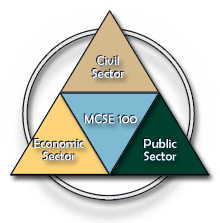
About FranTech México Tri-Sector
TRI-SECTOR PARTNERSHIP MODEL
To ensure that the above mentione ed nine basic human needs are addressed on an indi ividual and community level Tri Sector Partners ship has been developed. Tri sector includes Public SSector, Civil Sector and Economy Sector which encompass all aspects of a society.
Tri-Sector Partnership, as a refined development paradigma is based on the knowledge that sustainable development requires all key playerrs to work together for change and sustainable, neutral global development. How do we understa and interpret and develop ongoing and profitable pa artnerships to realize these objectives?
THE NEUTRAL TRADE ORGANIZATION (NTO) and THE NEUTRAL ZONE FEDERATION (NZF)
recognize and are expandin ng upon and leveraging
the collaborative e potential of the three main sectors of soociety.
THE MAIN SECTORS
THE KEY ROLES OF THE SECTORS:
- Public Sector: Creates thhe framework for economic, political and social rights and providees regulations and standard setting mechanisms.
- Economy Sector: Investstment and trade creates goods and services. Maximizes profit fo or investors. Provides Employment opportunities, Innovation an nd economic growth.
- Civil Society Sector: So ocial development creates opportunities for individual growth and creatively Provides support and services for tho ose in need or excluded from mainstream society.
THE SECTOR ATTRIBUTES:
- Public Sector is Right-driven-provides information, stability and legitimacy And tends to be bureaucratic and intransigent.
- Economy Sector is Profit-driven-is inventive, single-minded and fast And tends to be single minded and competitive.
- Civil Society Sector is Value-driven-is responsive, inclusive and imaginative And tends to be combative and territorial.


